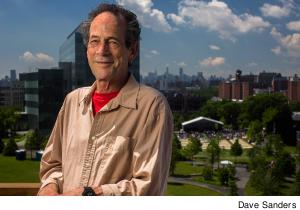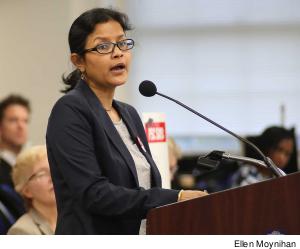When Vincent Boudreau, a dean at City College of New York and a former professor of political science, became City College of New York’s (CCNY) interim president last year to replace the embattled Lisa Coico, faculty were pleased with the choice.
 |
“He has a real history here, he worked his way up,” said Alan Feigenberg, then the City College PSC chapter chair and current union delegate. “This was a really good move. Most of us felt good about it.”
Faculty members felt so good about it, in fact, that members of the college’s faculty senate pushed the administration to consider Boudreau for the permanent position, Feigenberg recalled. But early on in the presidential search process, Feigenberg and others learned that Boudreau was no longer being considered. Moreover, there was no explanation of the reason, and the administration appointed a search committee that did not include a union representative. “The whole routine was very closed,” Feigenberg said. “It was a departure from past practice.”
NEW CUNY POLICY
City College isn’t alone. Presidential searches at John Jay College and Brooklyn College have disturbed faculty and union officials because they have been conducted according to a new CUNY policy that allows candidates for CUNY presidencies to remain secret. In such searches, there are no public meetings on campus for finalists with faculty, staff or student representatives. The new policy provides that when one candidate demands confidentiality, all candidates are granted confidentiality. The fear among faculty is that closed searches will be the new norm for presidential searches at CUNY.
“I think this is a continuum by CUNY Central to assume more and more control over pretty much everything, to de-democratize what happens on campus,” said Feigenberg. Closed searches mean that there is no opportunity for candidates to meet union representatives on campus or for union leaders to interview them. The trend of not including the union in searches is troubling on several fronts, including labor relations.
 |
“It is imperative that candidates for the position appreciate that they will be working in a unionized environment,” PSC Secretary Nivedita Majumdar said in testimony to the CUNY Board of Trustees in April. “As a former chapter chair, I can testify that college presidents not only work closely with PSC chapters on contractually mandated matters, but also on issues relating to strategic directions for the institution. Because a productive relationship between college presidents and the union is deeply in the interest of the institution, the formal exclusion of the PSC in presidential searches is both inexplicable and unacceptable.”
That same month, dozens of faculty and staff at John Jay College signed a letter to Chancellor James Milliken arguing that the current model for the presidential search process, they believed, “eschew[ed] transparency,” by invoking candidate confidentiality.
The letter stated, “John Jay College is a public institution that provides a service to its students and the people of New York, and a community of learning and scholarship bigger and far more important than any one individual. Acknowledging this reality is all the more important for the college’s leaders, whose service to the institution, its mission, its history and its present-day community must be unequivocal and beyond reproach. We the undersigned do not believe that individuals unwilling to publicly declare their intention to serve John Jay College as its chief executive…can fulfill these criteria. This manifest lack of transparency raises serious questions about the legitimacy of the whole process and undermines our institution’s commitment to ‘educating for justice.’”
‘CONFIDENTIAL’ SEARCHES
The search committee at Brooklyn College to replace Karen Gould did include three faculty members and two students, all selected by the college administration, in addition to administration officials. However, the administration made it clear that confidentially would be granted to the candidates into the final stage of the search, which traditionally has been a public stage. Michelle Anderson, a former dean at the CUNY School of Law, was eventually appointed.
The administration’s rationale, according to Brooklyn College PSC Chair James Davis, who served on the search committee, is that confidentiality would make it easier for candidates to participate in the search, as rumors of their departure from their current institutions could disrupt their work. George Mason University academics Judith Wilde and James Finkelstein, emeritus, wrote in the Chronicle of Higher Education in April, “anxiety among candidates fearing that their names will become public has resulted in a substantially increased workload for search committees and consultants attempting to recruit top candidates,” which has increased the use of confidentiality agreements.
Davis said that on the one hand this made sense, however, “it’s a creep into the corporate model of executive searches that is not typical of how academia has conducted itself over time.”
He also noted the lack of transparency in the search for a new executive lowered faculty and staff morale. “It has fed into the cynicism that the administration wants to keep us in the dark,” Davis said. “If CUNY management wants to diminish that cynicism it would be good to be inclusive and transparent when they can.”
The trend doesn’t violate New York State law or internal CUNY policy; it does, however, fly in the face of a long-standing American Association of University Professors (AAUP) standard. In fact, the association’s Statement on Government of Colleges and Universities reads, “Joint effort of a most critical kind must be taken when an institution chooses a new president. The selection of a chief administrative officer should follow upon a cooperative search by the governing board and the faculty, taking into consideration the opinions of others who are appropriately interested. The president should be equally qualified to serve both as the executive officer of the governing board and as the chief academic officer of the institution and the faculty. The president’s dual role requires an ability to interpret to board and faculty the educational views and concepts of institutional government of the other. The president should have the confidence of the board and the faculty.”
CORPORATIZATION OF COLLEGES
The dual role of a president is key, said Michael DeCesare, the AAUP’s chair of the standing committee on college and university governance. The reason for faculty input on presidential hiring has been that the president isn’t just an executive of the university as a business entity, but the leader of the pedagogical workforce. But the corporatization of colleges and universities in the past few decades has prompted, or has led to college and university boards focusing their searches on the former role but not the latter.
In addition, college and university presidential searches nationwide have relied more heavily on outside search consultants. Between 10 and 12 percent of searches used such firms in the 1970s; the number is up to 80 percent now, according to the AAUP, and these firms are used to do the search work that was once the domain of faculty representatives on search committees.
“The idea is that it eases the burden on the search committee and that the firm is best suited to choose the best candidate,” DeCesare told Clarion. “It’s all in the name of greater efficiency. There’s no evidence that I’ve seen that it results in better searches or applicant pools.”
‘RIGHT TO PRIVACY’
Wilde and Finkelstein commented, “This so-called right to privacy increasingly has become the norm in presidential searches. However, it is based on a premise for which we can find no empirical support. Rather, we are forced to rely on ‘evidence’ provided by those who stand to benefit most from secrecy – the successful candidate and the search firm that is paid to find the candidates. This degree of confidentiality seems to be at odds with standard practices for hiring other public executives, as well as contrary to the core values of a university.”
Davis noted that the Brooklyn College search included an outside search firm, which on the one hand “was very helpful,” but also “created a context in which the new confidentiality policy would be an inevitability.”
One consequence of this trend is an increase in campus spending on outside consultants while faculty are left out of the process, he said. Another problem is that this trend has contributed to more presidencies going to lawyers, politicians and other people with managerial experience but little to no experience in academia.
CUNY responded in a statement, “Searches for university presidents and chancellors, at public universities across the country, have become a balance between the openness most would like to see and the goal of attracting the best candidates to the pool. At CUNY, the board’s guidelines for these searches require that the committee include members of the faculty, the administration, the students and alumni, among others, so that faculty are integral to the process. In addition, finalists meet with and are interviewed by groups of faculty and students, and that has been the case in recent searches. But the simple fact is that sitting presidents and other high-profile leaders from other institutions are seldom inclined to be part of a very public process with other candidates; it can create challenges for these leaders at their current institutions if they remain at them. So it’s not surprising that many of the leading universities in the country conduct searches that are confidential.”
Most recently, for example, SUNY’s chancellor search concluded with the announcement of a single, successful candidate, with no open process at the end. CUNY noted that the recent appointment of a new chancellor at SUNY ended without an open process at the end. “This has become the rule at our largest public universities,” the statement said. “In addition, even the confidential search process, adopted only upon recommendation of the search committee, includes many faculty, student and staff participants in the final stage.”
UNION INPUT
“Locally, faculty and staff have to fight against this,” DeCesare said. “So when there’s a search happening, they need to demand a role on the search committee.”
PSC President Barbara Bowen told Clarion, “Closed presidential searches violate the norms and goals of a public institution. There is no substitute for the knowledge gained on both sides when candidates meet with elected campus leaders and groups of faculty, staff and students. What worries me is the normalizing of corporate conventions in a public institution and the deliberate exclusion of faculty, staff and their union. The PSC leadership has registered our concern about the pattern of such searches with the chancellor’s office.”

